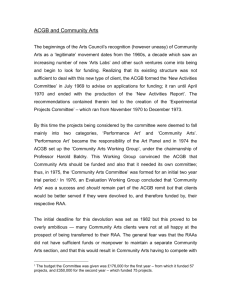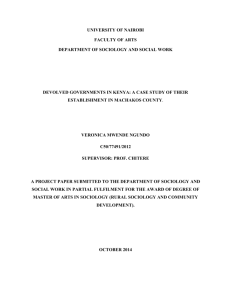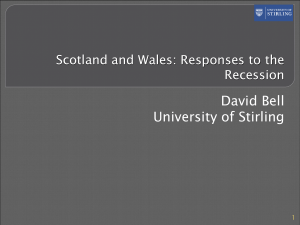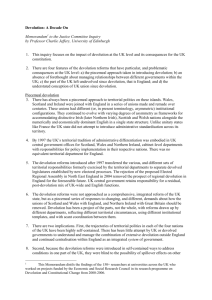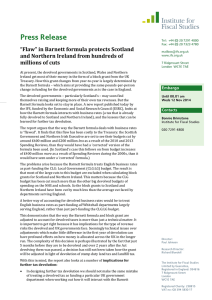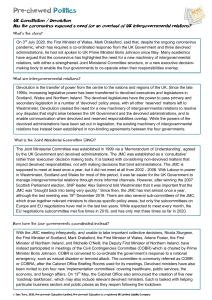Engendering Policy and Devolution – 21 November 2008, HRC Warwick... The processes of constitutional change ... assemblies in Wales, Scotland and ...
advertisement
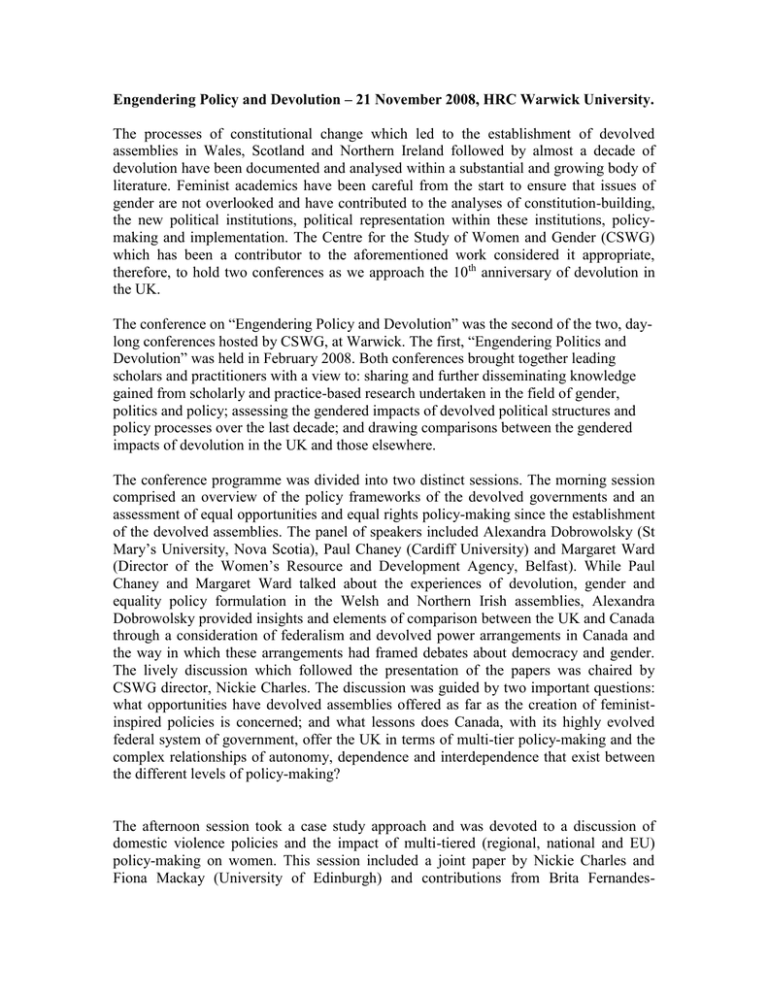
Engendering Policy and Devolution – 21 November 2008, HRC Warwick University. The processes of constitutional change which led to the establishment of devolved assemblies in Wales, Scotland and Northern Ireland followed by almost a decade of devolution have been documented and analysed within a substantial and growing body of literature. Feminist academics have been careful from the start to ensure that issues of gender are not overlooked and have contributed to the analyses of constitution-building, the new political institutions, political representation within these institutions, policymaking and implementation. The Centre for the Study of Women and Gender (CSWG) which has been a contributor to the aforementioned work considered it appropriate, therefore, to hold two conferences as we approach the 10th anniversary of devolution in the UK. The conference on “Engendering Policy and Devolution” was the second of the two, daylong conferences hosted by CSWG, at Warwick. The first, “Engendering Politics and Devolution” was held in February 2008. Both conferences brought together leading scholars and practitioners with a view to: sharing and further disseminating knowledge gained from scholarly and practice-based research undertaken in the field of gender, politics and policy; assessing the gendered impacts of devolved political structures and policy processes over the last decade; and drawing comparisons between the gendered impacts of devolution in the UK and those elsewhere. The conference programme was divided into two distinct sessions. The morning session comprised an overview of the policy frameworks of the devolved governments and an assessment of equal opportunities and equal rights policy-making since the establishment of the devolved assemblies. The panel of speakers included Alexandra Dobrowolsky (St Mary’s University, Nova Scotia), Paul Chaney (Cardiff University) and Margaret Ward (Director of the Women’s Resource and Development Agency, Belfast). While Paul Chaney and Margaret Ward talked about the experiences of devolution, gender and equality policy formulation in the Welsh and Northern Irish assemblies, Alexandra Dobrowolsky provided insights and elements of comparison between the UK and Canada through a consideration of federalism and devolved power arrangements in Canada and the way in which these arrangements had framed debates about democracy and gender. The lively discussion which followed the presentation of the papers was chaired by CSWG director, Nickie Charles. The discussion was guided by two important questions: what opportunities have devolved assemblies offered as far as the creation of feministinspired policies is concerned; and what lessons does Canada, with its highly evolved federal system of government, offer the UK in terms of multi-tier policy-making and the complex relationships of autonomy, dependence and interdependence that exist between the different levels of policy-making? The afternoon session took a case study approach and was devoted to a discussion of domestic violence policies and the impact of multi-tiered (regional, national and EU) policy-making on women. This session included a joint paper by Nickie Charles and Fiona Mackay (University of Edinburgh) and contributions from Brita Fernandes- Schmidt (Women’s National Coalition) and Marsha Scott (European Women’s Lobby Observatory on Violence Against Women). Nickie Charles and Fiona Mackay compared the development of domestic abuse strategies in the devolved legislatures in Scotland and Wales. Brita Fernandes-Schmidt spoke of the impact of lobbying work, done by organisations such as the Women’s National Commission, on domestic abuse policy formulation while Marsha Scott considered current and proposed policies on domestic abuse at Scottish, UK and EU levels and the implications of and for devolved structures. Chris Harrison (Centre for the Study of Safety and Wellbeing, School of Health and Social Studies, Warwick) did an expert job of bringing together the most salient themes of the afternoon contributions and of reflecting on the future of policy making in the area of domestic violence. The conference was well attended by academics, PhD students and practitioners and was a great success in that participants returned positive feedback in terms of the knowledge that they had gained and the contacts that they were able to establish for possible collaborative work in the future. In addition, the conference organisers are in the process of developing a special issue of the journal Social Politics.

